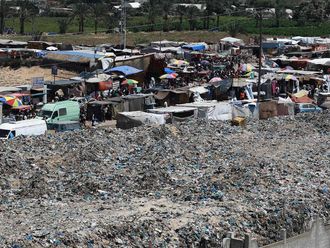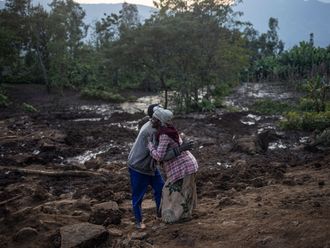Dubai: Enthusiastic Iraqi voters, who swarmed voting centres some six months ago to choose their new lawmakers, never thought they would be without a government for more than 180 days because of a political impasse created by their own democratically elected leaders.
Political analysts and politicians said they have almost lost hope that any solution to the present situation will be found without strong interference by external powers.
Yet this was once considered a hindrance to reaching any solution.
Many Iraqis say they have lost confidence in their country's ability to rise again. Many have left Iraq for neighbouring countries where they are awaiting the approval of western countries to accept them as refugees from what once was called "Liberated Iraq".
"Those, the majority of course, who had no option to leave the country are still struggling with power shortages and saline water and [a] lack of drainage system... the basics that they enjoyed under dictatorship," Baghdad University political science professor Dr Hassan Ali said.
"For them the fight over who is going to form the government is a sort of luxury they can not afford under the pressures of daily life."
He said that parliament, which is required by the constitution to elect the speaker of the House, the president of the country and the new prime minister to run the country for the next four years, had so far failed to perform its duty since it convened in June.
Rebuilding efforts
He said Iraqis badly needed an active government to rebuild infrastructure and embark on developmental projects seven years after the occupation of the Iraq and terrorist challenges that have affected the country.
Iraq has been without an executive since the results of the election were announced by the Independent High Electoral Commission on March 26.
The power vacuum has almost crippled all government projects and halted the planning process within the country.
Mohammad Salman, a senior member of the Iraqiya bloc and a former member of the parliament, told Gulf News that many Iraqis believed the problem started right after the result of the constitutional election was announced.
This was when the incumbent Prime Minister Nouri Al Maliki claimed that his State of Law bloc, which came second in the election with two seats less than the Iraqiya bloc, would form the government.
"The Iraqiya and a number of other political blocs felt that the behaviour of Al Maliki [violated] the spirit of the Iraqi constitution and the democratic traditions practised all over the world," Salman said.
Salman added that the constitution was twisted to suit Al Maliki's ambition to remain in power following a Federal Supreme Court ruling that said that the largest political group in the parliament, that was required to form the government, was not necessarily the winner of the election.
This was because any political group could form a coalition with another bloc, or more, to form a majority in the house.
"This is [a] very strange principle in politics because it allows the losers to form bigger alliances with each other and form the new government in Iraq in defiance of the majority," Salman said.
He said the Iraqiya bloc should be given the first opportunity to form the government.
Al Maliki, who has refused to admit defeat, has stressed that he has the constitutional right — as per the Federal Supreme Court ruling — to form the next government.
However, he has since failed to do so. Sources close to Allawi blamed the United States for failing to take a clear stand on the current political deadlock.
The United States wanted to see a prime minister who was capable of controlling Iran's influence in the country and who was, on the other hand, free of Arab and nationalist ideologies.










_resources1_16a30b3523c_small.jpg)

